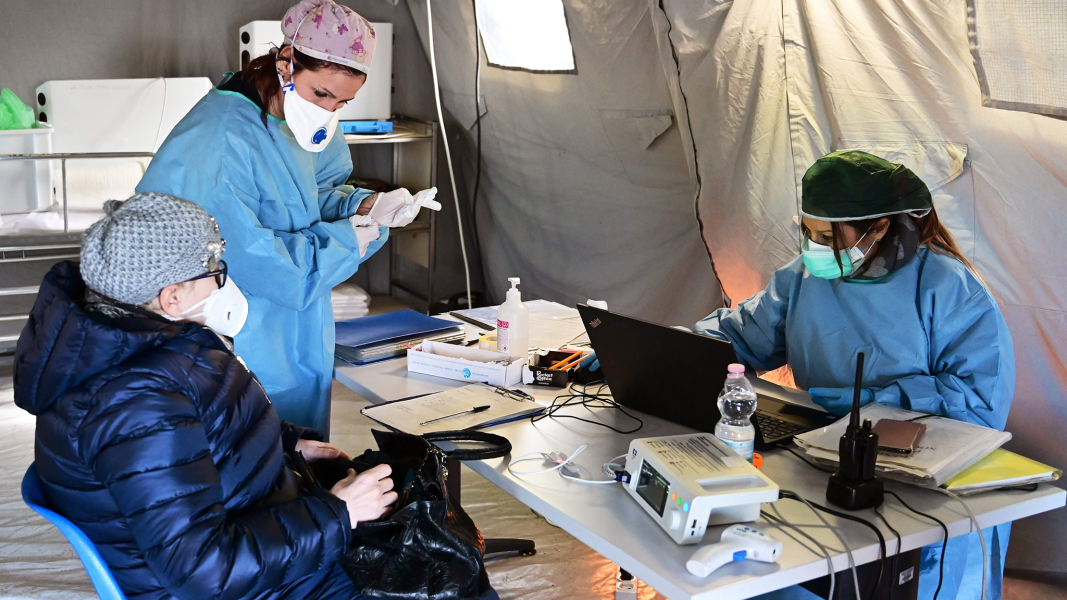In a world where laughter is already in short supply, the outbreak and rapid spread of Coronavirus has only left us all the more depleted. The world, as we know it, has been turned on its head. Yet, in this once-in-a-lifetime experience we have examples of fate using tragedy to write the book of humour.
Who could have believed that Mexico would be contemplating border restrictions with the US or that vacationing Italians will choose to be refugees in Ethiopia or Tunisia instead of returning to their country which, until recently, turned away hundreds of migrants from Africa and the Middle East?
But this unusual turn of news is spreading just as rapidly as Covid-19, the strain of the Coronavirus that has gripped the world.
Last week, Al-Jazeera reported that the Mexican authorities were considering restrictions along the border with the US after the virus spread like wild fire across the US, impacting 50 states and forcing President Donald Trump to announce extraordinary measures to contain the spread.
Advertisement
In California, a US state which shares a border with Mexico, eight million residents were forced into shelters this week. Only a few years ago, Trump’s greatest desire was to build a 2,000-mile long wall, cutting off Mexico from the US. He said at the time that Mexicans, those good-for-nothing drug dealers, coyotes and rapists, would also pay for the wall.
But all the talk about building a wall has now gone quiet and Trump was at his meekest last week after a close shave with Covid-19. In a tragic turn of humour, while US citizens and businessmen are complaining that any border restrictions at this time might adversely affect the supply chain in US factories, Mexicans are asking themselves why they didn’t take up Trump’s earlier offer to build the wall.
Even if they had to pay for it, it certainly would not have been with their lives as they may be obliged to do if persons fleeing from the US spread the virus from across the San Ysidro border.
Advertisement
A similar spectacle of irony is also playing out in Ethiopia where 35 Italian tourists had gone on holiday. The tourists, whose visas had expired, refused to return home, preferring to stay on in Ethiopia as refugees, rather than return to Italy, which is currently in lockdown.
Who would have thought that a day like this would ever come? At the height of the migrant crisis in Europe three years ago, a story leaked that would have brought tears to the eyes of even those who may have eaten the proverbial head of the tortoise. It was a video of dozens of refugees from Africa and Syria, drowning in the Mediterranean Sea in 2013.
Their boat was only a few miles from the Italian port of Lampedusa and the distressed migrants could see the shore. Then, suddenly, their boat started taking in water and began to sink. They cried out to the Italian Coast Guards who were nearby for help. Mohammed Jammo, who identified himself as a Syrian doctor aboard the sinking boat, could be heard in the video crying to the guards: “Please hurry, the boat is going down!”
One of the guards replied: “Because you are near Malta, call Malta directly very quickly, they are close. Ok?”
Advertisement
Jammo then called again, “We are dying, please.” And the Italian guard replied: “You have to call Malta, sir.”
That was the last call. The boat capsized, and all the passengers died.
To be sure, Italy recorded a number of heroic interventions during the migrant crisis, but incidents like Jummo’s will forever taint Italy’s humanitarian record. Addis Ababa does not need to repay the 35 Italian tourists in the coin of the coast guard. That is the only way to tell the “call Malta” guard and millions of people like him around the world that we’re all in the same boat. Who knows where the wind will blow next?
The Covid-19 irony does not end there. Also, this week, a British cruise ship which had been marooned at sea since February ending was finally called to shore in the most unlikely of places: Cuba. The ship, owned by a British cruise ship company had been denied berthing throughout the Caribbean – and that includes Barbados, a country with strong British heritage and ties.
Advertisement
Even though there were 667 Brits out of the 682 passengers on board, Barbados took a deep, long breath and asked the cruise ship, which had only five confirmed victims onboard, to look elsewhere for help.
Help came, not from longstanding British allies in the Caribbean (not even Barbados fondly called ‘Little England’) or North America, but from Cuba, the Communist cauldron which British intellectuals love to hate.
Advertisement
While Cuba was opening the door to the British cruise ship, Prime Minister Boris Johnson’s best friend, Trump, was extending travel ban to UK citizens, in spite of US-UK mutual claim to a special relationship.
Yet, this gift of irony is not only in the relations among countries. Even within national boundaries and from the heart of a number of the most impacted communities come remarkable stories of the triumph of the human spirit. Citizens trying to help have formed clusters of compassion around the world, such as, Covid-19 Mutual Aid Facebook and Kindness Pandemic Facebook, sharing online help forms, tips and messages to millions desperately in need of help.
Advertisement
In Turin, Italy, every night since the countrywide lockdown started two weeks ago, people come to the balcony or stay at their windows to play a guitar or sing the national anthem or a folk song. Despite their isolation, they still find a way to stay connected.
And did you notice that the same Chinese who were left by the rest of the world to stew in the virus when it first broke out were among the first group of foreigners to arrive in Italy to help stem the tide when Italy’s neighbours were closing their own borders?
Advertisement
In the UK, a charity, Mutual Aid, is plowing the streets with messages of help for the elderly or those in self-isolation. And in one particularly telling story in the US, an elderly couple stranded in their car for hours, frightened and unable to stand in the long lines just to buy groceries and loo rolls, finally got help from folks who offered to shop for them while they waited inside their car.
And then, of course, there’s the indescribably odd bit. Whereas gun sales in the US tend to rise after an election or a mass shooting, there was a report during the week of long lines of customers at a gun shop in Los Angeles.
One of the customers said he decided to arm himself, just in case things get “a bit crazy” in low income neighbourhoods: that is, he thought he needed to arm himself in case rioting broke out in poor neighbourhoods where, at the current rate, staples could run out of supply.
But think of it: who is more likely to clean out the shelves, buying what they don’t need and sowing the seed of trouble? The man who can afford a gun or the man who can barely buy bread? Someone should have told the man that long before staples run out, love runs out first.
These are not your regular stories. Or regular times. But even in Wuhan this minute, tragedy is writing the book of humour; the story of the ultimate triumph of the human spirit.
Ishiekwene is the MD/Editor-In-Chief of The Interview
Views expressed by contributors are strictly personal and not of TheCable.
Add a comment







